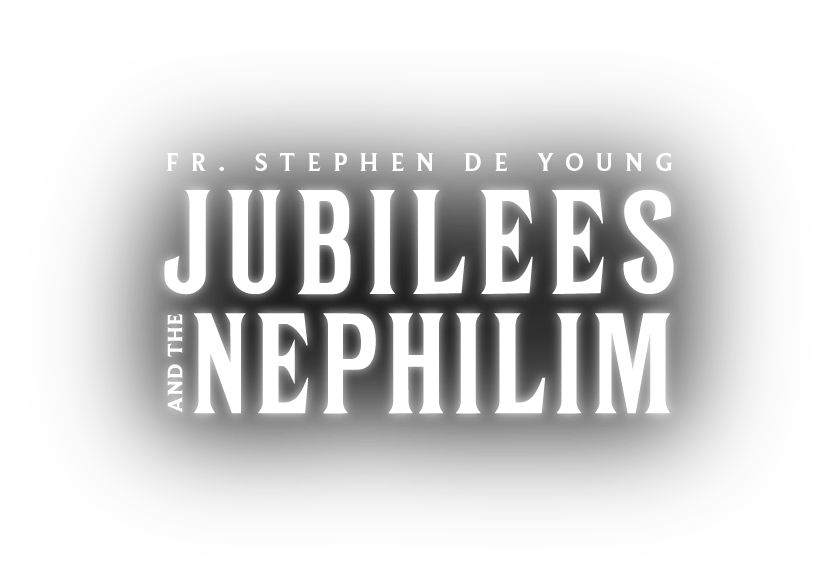Answer: The course is hosted on the Symbolic World Circle platform that you can access if you navigate to the Community tab at the top of our website. You must have a Symbolic World account (which you can create for free), and also set up a Circle profile. Here is a quick direct link to the course if you’re already signed in.
Jubilees and the Nephilim
By Fr. Stephen De Young



Jubilees and the Nephilim
By Fr. Stephen De Young
Exclusive Discount to Symbolic World VIP Patrons
JUBILEES3289
Patrons at the Involved tier or higher qualify for 10% discount. Log in and see your discount code at the top of the page.
Step into the strange and revelatory world of the Book of Jubilees, an ancient retelling of Genesis that shaped ancient Jewish thought and still echoes through Christian tradition. In this course, Fr. Stephen De Young guides students through the book’s expansion of biblical history, unveiling the significance of the fall of the angels, the rise of the Nephilim, and the heavenly origins of the feasts of the Old and New Testaments. Along the way, he'll explore how Jubilees reinterprets creation, demonology, and the prophetic structure of time, and why these themes mattered not only to Second Temple Judaism, but to later Christian understandings of the unseen world.

Course Overview
180 USD
6 Weeks, 12 Hours
Live classes are hosted on the Symbolic World Circle community on Tuesdays, 7 - 9 PM CT, starting August 19th through September 23rd, 2025
The Book of Jubilees is an interpretive expansion of the narrative of the book of Genesis and the early portions of the book of Exodus. Dating to the Second Temple period, this text compiles traditional interpretation of the stories and narratives contained therein that predate Christianity as such. Jubilees therefore provides an important bridge between the Christian Old Testament and interpretations of those texts found in the New Testament. As part of the Enochic literature, Jubilees frames the rise of sin and evil in the world and amongst humans in the terms of an angelic rebellion against the Creator God. The human participants in this rebellion becomes known as the Nephilim, the giants, whose memory echoes out through the rest of the Hebrew Bible and into the New Testament. Motifs such as Christ’s exorcisms in the Synoptic Gospels find their explanation within Jubilees. For centuries after the solidification of the Biblical canon, Jubilees continued to be used in Christian circles as a commentary both reliable and ancient upon the historical traditions contained in the book of Genesis.
This six week class will explore the content and ongoing significance of the Book of Jubilees within the Church. Far from being just an ancient curiosity, what Jubilees has to say about the problem of evil, the justice of God, the activity of demons and demonized humans, as well as countless other topics has an ongoing relevance to the lives and understandings of followers of Christ. The Book of Jubilees is a piece of the Holy Tradition and inheritance of Orthodox Christians that today can and should be recovered by the current generation.
What You’ll Learn
- The origins, composition, and structure of the Book of Jubilees
- How Jubilees expands and interprets Genesis and Exodus
- The role of the Nephilim and angelic rebellion in framing human sin
- How themes in Jubilees echo throughout the New Testament
- The ongoing significance of this text for Orthodox Christian theology
- Why the Book of Jubilees was preserved and used by early Christians
Course Details
Live Course Schedule
What you'll need
Slides will not be used during the course so it's recommended that you take your own notes. Fr. Stephen will work from the translation of the Book of Jubilees in Charlesworth's Old Testament Pseudepigrapha, so that would be recommended for both Jubilees and some other referenced texts.
Lesson plan
Class 1 - 8/19
- Hour 1 - Introduction to the Book of Jubilees - Date, Composition, Structure, Importance
- Hour 2 - Chapters 1-4 - Moses on Mt. Sinai and the Story of Creation
Class 2 - 8/26
- Hour 1 - Chapters 5-10 - Noah and the Flood
- Hour 2 - Chapters 5-10 (cont’d) - The Nephilim Before the Flood
Class 3 - 9/2
- Hour 1 - Chapter 11-23:8 - The Life of Abraham
- Hour 2 - Chapter 23:9-32 - The Death of Abraham
Class 4 - 9/9
- Hour 1 - Chapters 24-45 - Life of Jacob
- Hour 2 - Chapters 24-45 (cont’d) - Jacob’s Sons
Class 5 - 9/16
- Hour 1 - Chapters 46-50 - The Figure of Moses
- Hour 2 - Wrap-Up - The Ongoing Importance of Jubilees
Class 6 - 9/23
- Hour 1 & 2 - Conversation with Jonathan Pageau
Related Content
Presenters

Fr. Stephen De Young
The Very Rev. Dr. Stephen De Young is Pastor of Archangel Gabriel Orthodox Church in Lafayette, Louisiana. He is also the host of the Whole Counsel of God podcast from Ancient Faith and author of the Whole Counsel Blog, as well as co-host of the Lord of Spirits podcast. Fr. Stephen holds master’s degrees in theology, philosophy, humanities and social sciences, and a Ph.D. in Biblical Studies from Amridge University.
AFP publications include: The Religion of the Apostles: Orthodox Christianity in the First Century, The Whole Counsel of God: An Introduction to Your Bible, Apocrypha: An Introduction to Extra-Biblical Literature, God Is a Man of War, and Paul the Pharisee: Jewish Apostle to All Nations.
